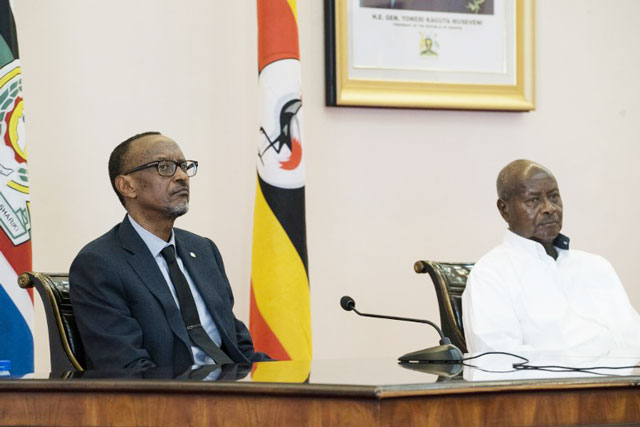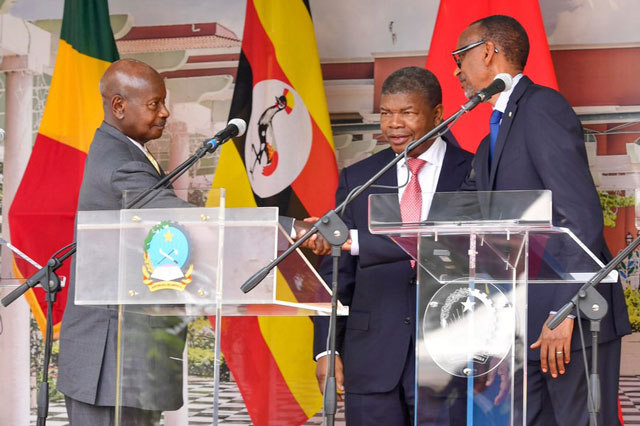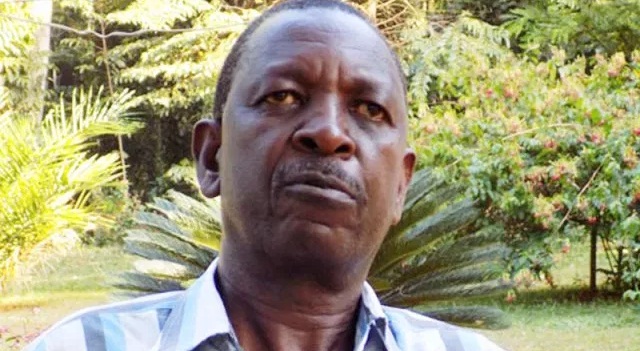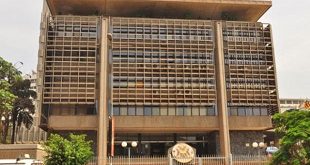
Museveni-Kagame tension, diplomacy; What to look out for next
Kampala, Uganda | RONALD MUSOKE | Despite their hyped reconciliation meeting and handshake on Aug.21 in the Angolan capital, Luanda, tense relations between President Yoweri Museveni and his Rwandan counterpart, Paul Kagame, appear likely to remain unless one of them makes a major reconciliatory gesture.
It all depends on the setting up of an Adhoc Commission supposed to trigger the implementation of the Luanda pact.
Museveni and Kagame agreed that the Adhoc Commission will be headed by the ministers of foreign affairs and composed of ministers of internal affairs/Administration and heads of intelligence.
Although it is straight forward in appearance, the composition of the commission will require a lot of work to ensure that the hardline personalities currently occupying those positions can make it work.
That may explain why a statement from President Museveni’s press officers on Aug.21 that screamed: “Cross border activities to resume as Uganda, Rwanda sign pact” now appears to have been overly optimistic.
The statement was released moments after the Luanda agreement was signed and cheers and jubilation broke out at the Uganda-Rwanda border crossing at Katuna. Petty traders hurriedly cleaned their stalls in readiness for business and politicians made celebratory speeches. But nothing changed.
Instead on Aug.22 Rwanda’s Minister of State for Foreign Affairs, Regional Cooperation and EAC Affairs, Olivier Nduhungirehe, issued another alert for Rwandans not to travel to Uganda. He cited safety concerns.
“There are still some issues to be resolved between the two countries before people start travelling to Uganda,” he said and added that Uganda must first release Rwandan citizens allegedly in detention in Ugandan jails.
The same day, it emerged; the Uganda Communications Commission (UCC) had ordered Uganda’s internet service providers to block access in Uganda to the website of the Rwandan government-owned New Times newspaper.
Ibrahim Bbosa, the UCC spokesperson said the communications regulator had directed internet service providers to block The New Times for publishing harmful propaganda that endangers national security of Uganda.
Within hours, Rwanda retaliated by blocking access to several Ugandan news websites including The Observer, The Nile Post, Soft Power and The New Vision.
It was a repeat of what happened 12 days after the leaders first met in Angola, when about 40 Rwandans were arrested in Kampala during a security operation.
Then on Aug.13, nine Rwandans who said they had just returned to Rwanda after days of detention and torture in Uganda filed a case against the government of Uganda in the East African Court of Justice.

Hardline on open borders
Against this background, Nduhungirehe who qualifies to be on the Kigali team on the adhoc committee has emerged as the stern voice of anti-Uganda rhetoric. Uganda meanwhile has its own hardliners. Although Museveni, who has warned all his officials off the Rwanda issue, prefers a softer public approach, he has in the past stocked anti-Rwanda sentiments.
In January 2017 he elevated two anti-Rwanda officials; Col. Frank Kaka Bagyenda and then Brig. Gen. Abel Kandiho to respectively head the Internal Security Organisation (ISO) and the Chieftaincy of Military Intelligence (CMI).
Both qualify to be on the Ugandan team on the adhoc commission but Kandiho is said to have few friends in Kigali where he worked until the early 2000s and clashed with Rwandan security operatives.
In March 2018 Museveni also removed with disgrace the once powerful Inspector General of Police, Gen. Kale Kayihura, who was amiable to Kigali. Kagame was the best man at Kayihura’s wedding. He was later charged with kidnapping of Rwanda nationals and illegally rendering them to Kigali. The charges were brought by Kaka Bagyenda.

Kagame also in October 2018 shuffled his cabinet, removing long-serving Defence Minister Gen. James Kabarebe and the Inspector General of Police, Emmanuel Gasana, who had been close to Kayihura. He elevated Dan Munyuza, the former deputy IGP.
With faces like Olivier Nduhungirehe on the Rwandan side and Kaka Bagyenda and Abel Kandiho on the Ugandan side, the proposed adhoc commission faces a tough road to a breakthrough. If it succeeds, its task is relatively easy.
Although Museveni and Kagame signed a slew of diplomatic soup, the main immediate issue of implementation is opening of the main Rwanda-Uganda border and easing of persons and goods.
In the section, subtitled `THE AGREEMENT’ the State House statement said Museveni and Kagame agreed to respect each other’s sovereignty and of neighbouring countries, refrain from actions that destabilize other countries, as well as financing, training, and infiltration of destabilizing forces.
According to the statement, Museveni and Kagame agreed to respect and protect the rights and freedoms of the nationals of the other party residing or transiting in their national territories, in accordance with laws of their countries.
“The pact indicates that the two countries will resume cross-border activities, including movement of persons and goods,” the Museveni State House statement said. This is what really matters.
The tension between Museveni and Kagame is nothing new and unlikely to hurt either of their economies because trade volumes between Kigali and Kampala are low; worth US$171 million for Uganda in 2017 and US$9.4 million for Rwanda, but continuing the standoff means local border economies and specific traders continue suffering.
 The Independent Uganda: You get the Truth we Pay the Price
The Independent Uganda: You get the Truth we Pay the Price




Kagame alinga yalagira museveni ekyokukola naye olwokuba nti M7 tayagala kulaga amanyi nobusobozi. aleka mune nalekana ng’ali ku mpingu. kagame kilabika yekengera missions ze zeyayina ne kayihura. **M7 mune amuli bukika kubanga kirabika kayihura abanyarwanda abangi beyayingiza mu police kilabika kagame bayitiramu okutirimbura abantu nti bana uganda tukyawe M7 ne gov’t ya NRM. era ebya NRM byandiba nga ebya Goriyasi ne David. Kagame may make a record indirectly and asurprise to people power in ugandan amaso ku lutimbe.